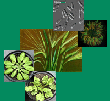| Farooq, MA; Detterbeck, A; Clemens, S; Dietz, KJ: Silicon-induced reversibility of cadmium toxicity in rice, Journal of Experimental Botany, 67, 3573-3585 (2016), doi:10.1093/jxb/erw175 | |
| Abstract: Silicon (Si) modulates tolerance to abiotic stresses, but little is known about the reversibility of stress effects by supplementing previously stressed plants with Si. This is surprising since recovery experiments might allow mechanisms of Si-mediated amelioration to be addressed. Rice was exposed to 10 µM CdCl2 for 4 d in hydroponics, followed by 0.6mM Si(OH)4 supplementation for 4 d. Si reversed the effects of Cd, as reflected in plant growth, photosynthesis, elemental composition, and some biochemical parameters. Cd-dependent deregulation of nutrient homeostasis was partially reversed by Si supply. Photosynthetic recovery within 48h following Si supply, coupled with strong stimulation of the ascorbate-glutathione system, indicates efficient activation of defense. The response was further verified by transcript analyses with emphasis on genes encoding members of the stress-associated protein (SAP) family. The transcriptional response to Cd was mostly reversed following Si supply. Reprogramming of the Cd response was obvious for Phytochelatin synthase 1, SAP1 , SAP14, and the transcription factor genes AP2/Erf020, Hsf31, and NAC6 whose transcript levels were strongly activated in roots of Cd-stressed rice, but down-regulated in the presence of Si. These findings, together with changes in biochemical parameters, highlight the significance of Si in growth recovery of Cd-stressed rice and indicate a decisive role for readjusting cell redox homeostasis. |

